Nigel Jarrett was at the Vale of Glamorgan Festival for a performance by the BBC National Orchestra of Wales, conducted by Graham Fitkin.
New music, often performed for the first time in public, is the rule at the Vale of Glamorgan Festival. This year its commitment was reinforced by the inauguration of a Composers Studio in memory of Peter Reynolds, a Vale Of Glamorgan Festival stalwart, who died suddenly last year. Reynolds’s music has been heard at the festival; he was a loyal supporter and much respected as composer and teacher. The project involves Cardiff University’s School of Music in linking novice composers with experienced ones whose music is being performed, often in their presence. Over eight days at selected venues in the Vale and Cardiff, the festival this year featured pre-eminently the work of the American, John Adams. There were no fewer than six world firsts: two by Guto Puw and including an opera sung in Welsh; a work for the six-piano Grand Band from New York by the American Ben Wallace; new pieces for the Marsyas Trio (flute, cello, piano) by Hilary Tann and Steph Power; and a new Recorder Concerto for Sophie Westbrooke and the BBC National Orchestra of Wales by Graham Fitkin. There were also UK premieres of arrangements of two works by Adams, and the Wales premiere of Huw Watkins’s accomplished Cello Concerto, written for his brother, Paul, and played by him.
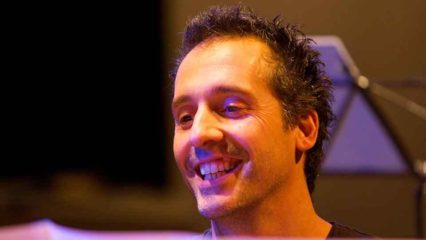
The Fitkin concerto was performed at the festival’s final concert. The sight of the casually dressed composer in trainers running from the audience to congratulate soloist, orchestra and conductor after a breathless delivery summed up the motor propulsion and lack of stuffiness in of much of his work. It’s Roussel on speed. That aside, the concerto is an important addition to the repertory for an instrument described as ‘ubiquitous’ but an unlikely candidate for a solo spot with a full orchestra, especially in Fitkin’s up-and-at-’em style. Actually it’s half a dozen amplified versions of the recorder, played here with astonishing composure and dexterity by Sophie Westbrooke, woodwind section winner at the 2014 BBC Young Musician contest. There are three principal themes but a lot of clever borrowing among them, so that some elements of one become subsumed under the other, and this is reflected in the developing relationship between soloist and orchestra.
Graham Fitkin requires the soloist to drive the train while wearing a series of interchangeable ‘hats’, these being the recorder’s differently pitched versions, the highest and most familiar appearing last in a marvellous ‘see what I can do’ flourish, and the lowest, the freestanding contrabass at over two octaves lower than the descant, mining the lower depths. They also included the tenor, and the conventionally-held bass at one-and-a-half octaves below and with a bend under the mouthpiece like a corrugated chink in a straw for ease of manipulation. All these subterranean regions were enhanced now and then with flutter-tonguing and sputato. It could have resembled mere display – I stopped counting the soloist’s changes at fifteen – if Fitkin’s essentially supportive orchestral accompaniment did not possess such an affinity for the bravura with which it was being led from the front, albeit in a sequence of fairly relentless musical blocks that must owe something to the composer’s studies with Louis Andriessen. Fitkin typically pre-empted complex analysis by saying it was the recorder’s column of air that interested him. He meant a column unimpeded by reeds, which in turn meant he could hand the soloist opportunities for blowing vigorously, especially with rapidly-executed figurations at the other end. Conductor Tecwyn Evans did much to maintain tempo and breeziness. Whether or not the journey left us just gasping is debateable. The problem for all composers is how to go on. Fitkin is as likely to hitch a lift on a moving vehicle as travel by divers means, and tentatively, to places unknown.
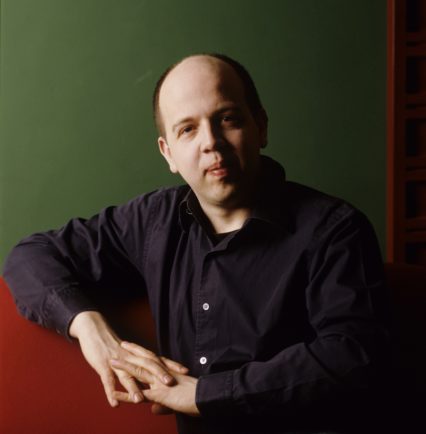
Paul Watkins was on hand to perform for the first time in Wales his brother Huw’s Cello Concerto with the orchestra that joined him for its Royal Albert Hall Proms premiere in 2016, though under a different conductor. Unlike the excited-passenger status conferred on the orchestra by Fitkin (and it’s no worse for that), Watkins mostly employs deliberation in enhancing and matching the cello’s solo lines with some magical sonorities, though the mood of the piece, with its slow-fast-slow arrangement of movements, echoes a familiar and peculiarly ‘English’ tradition lodged in the rhapsodic (but not the nostalgic). Its modernity, however, is persuasive, genuine, and mature, neither of the outer movements content with a uniform tempo. The codas of each are unsettled, especially that strange (witty?) reference at the end of the central section, and its solo lines resolute, unpredictable and burnished, especially as played by its dedicatee. It’s music that locates a place and remains there, quietly exploring its surroundings and reacting to it in several ways; in a word, consistent. From the orchestra’s point of view it was first among equals on the night for quality of playing, though there are caveats.
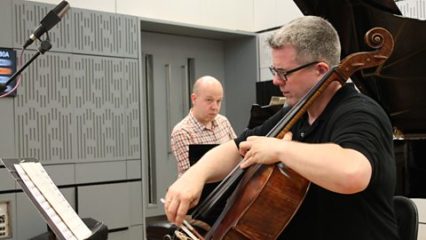
Even its apologists would agree that Hoddinott Hall is not so much a concert venue as a recording studio with limited public seating. It works for audiences up to a point, the point being that its acoustic is designed primarily to produce sound for capturing and later broadcasting, not for offering a refined listening experience associated with venues where recording is not the main reason for being. The consequences for the Hoddinott’s audiences are therefore twofold: a sound likely to appear richer and fuller when heard transmitted, plus – and this is really compensation – the opportunity to hear more contemporary music than the orchestra is ever likely to play at its St David’s Hall residency.
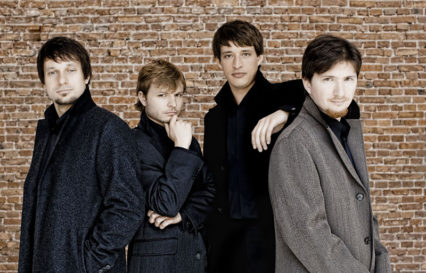
It’s pertinent to mention all this here, because, to varying degrees, each of the works played at this concert will sound better when heard on a half-decent receiver. This is especially true of Adams’s The Chairman Dances, spiked as it was with over-bright brass and woodwind sounds that often blurred the patterning. Although a sample that foreshadowed composition of his opera Nixon in China, its form does, like that of a lot of minimalist music, outstrip its content.
By contrast, but in an ironic way, his overlong Absolute Jest, for orchestra and string quartet, sounds as though the form is being stretched to breaking point by the main ingredient; namely, its giant nod towards the music of Beethoven. It would be possible for the framework to have accommodated in the form of quotation every work Beethoven wrote, and in its growing length and cacophony, this is what it sounds like. Pity Tecwyn Evans, buried somewhere in this overloaded racket ‘twixt the Apollon Musagète Quartet and the orchestra and, it must be said, appearing slightly overwhelmed as the textures begin to clot. One always sees the US minimalist trio in terms of smiles and delight. The broadest smile is Reich’s, and its barely concealed wryness, one feels, acknowledges that the other two, Adams and Glass, are taking on too much freight. Glass, of course, never smiles.
Vale of Glamorgan Festival, BBC National Orchestra of Wales
Hoddinott Hall, Wales Millennium Centre, Cardiff, 26 May 2017
BBC National Orchestra of Wales
Recorders: Sophie Westbrooke
Cello: Paul Watkins
Apollon Musagète Quartet
Conductor: Tecwyn Evans
John Adams: The Chairman Dances
Huw Watkins: Cello Concerto
Graham Fitkin: Recorder Concerto (world premiere)
John Adams: Absolute Jest
This concert was part of the Vale of Glamorgan Festival and was recorded live for broadcast tonight, Monday 29 May on BBC Radio 3
Header image of Sophie Westbrooke courtesy https://www.sophiewestbrooke.co.uk/
Recommended for you…
Nigel Jarrett is a former daily-newspaperman. He is a winner of the Rhys Davies prize and the Templar Shorts award for short stories, and is represented in the Library of Wales’s anthology of 20th–and 21st-century short fiction. He’s also written a poetry collection, a novel, and two volumes of stories. Among others, he writes for Acumen poetry magazine, Jazz Journal, and on music and other subjects for the Wales Arts Review. His pamphlet of stories, A Gloucester Trilogy, has just been published by Templar Press.
John Lavin reviews Gruff Rhys’ ambitious performance with the Orchestra of Wales as part of Cardiff’s Festival of Voice.


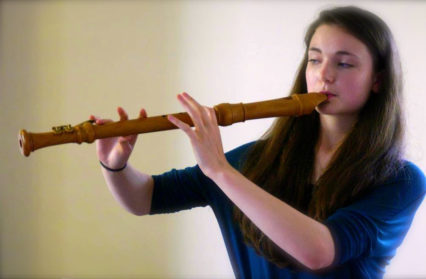
 Enjoyed this article? Support our writers directly by buying them a coffee and clicking this link.
Enjoyed this article? Support our writers directly by buying them a coffee and clicking this link.







